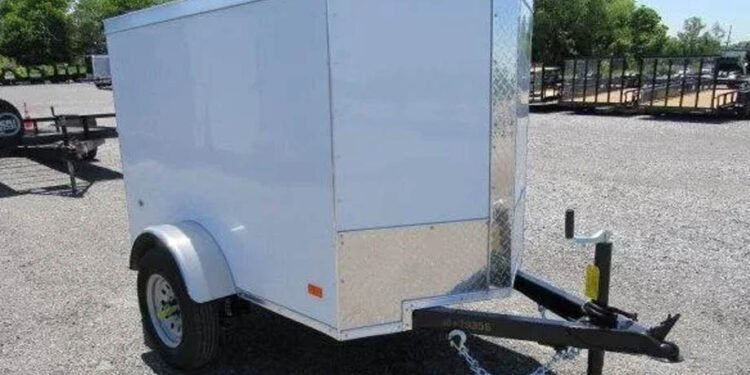When it comes to enclosed trailers, the options can be overwhelming. From different sizes and shapes to a myriad of features and colors, making the right choice requires some thoughtful consideration. Whether you’re hauling goods for your business or gearing up for a cross-country move, this guide will help you navigate the world of enclosed trailers with ease.
1. Size Matters: Finding the Perfect Fit
The first and foremost decision you’ll need to make when looking at enclosed trailers for sale is the size. It’s not a one-size-fits-all scenario, and choosing the right dimensions can make or break your hauling experience. Here are some common sizes and their ideal uses:
5×8 and 6×10: Compact and Convenient
These smaller trailers are perfect for light-duty hauling. Whether you’re moving a few pieces of furniture or transporting tools and equipment for your landscaping business, these compact options provide the convenience you need without the bulk.
7×14 and 7×16: Versatile Mid-Size Trailers
Mid-size trailers strike a balance between compactness and ample space. Ideal for hauling motorcycles, ATVs, or larger household items, these trailers are a popular choice for those who need a bit more room without going overboard.
8.5×20 and 8.5×24: The Big Players
For serious hauling needs, such as multiple vehicles or extensive equipment, these larger trailers are the way to go. Moving your entire household or transporting heavy machinery becomes a breeze with these spacious options.
2. Shapes that Suit Your Needs
Enclosed trailers come in various shapes, each catering to different requirements. Selecting the right shape ensures your cargo fits snugly while providing ease of access. Here are the most common shapes:
V-Nose Trailers: Aerodynamic Advantage
V-nose trailers have a sleek design, resembling the front of an arrow. This aerodynamic shape not only improves fuel efficiency but also provides additional space inside, making it an excellent choice for those looking to maximize cargo capacity.
Barn Door vs. Ramp Door: Entry Options
Consider how you want to load and unload your cargo. Barn doors swing open, offering easy access but require more space. On the other hand, ramp doors are convenient for loading heavy items on wheels, like motorcycles or lawnmowers, but may limit interior space.
Single vs. Tandem Axle: Stability Matters
The number of axles impacts stability and weight capacity. Single axle trailers are suitable for lighter loads, while tandem axles provide increased stability and support for heavier cargo. Choose wisely based on your hauling needs.
3. Color Choices: Beyond Aesthetics
While the color of your enclosed trailer may seem like a superficial choice, it can have practical implications. Consider these factors when deciding on the hue:
White: Temperature Control
White trailers reflect sunlight, helping to regulate interior temperatures. This is especially beneficial if you’re transporting temperature-sensitive goods or using the trailer as a mobile workspace.
Black: Sleek and Stylish
Black trailers make a bold statement. They’re sleek, stylish, and can create a professional image for your business. Keep in mind that black absorbs more heat, so temperature control may be a consideration.
Custom Colors: Branding and Visibility
If you’re using your trailer for business, opting for custom colors can enhance your brand visibility. A trailer that matches your company’s colors not only looks professional but also serves as a rolling advertisement wherever you go.
4. Must-Have Features: Enhancing Functionality
Beyond size, shape, and color, consider the features that will make your enclosed trailer work for you. Here are some essential elements to look for:
Interior Shelving and Tie-Downs: Organization is Key
Interior shelving and tie-downs are crucial for keeping your cargo secure and organized during transport. Whether you’re hauling tools, merchandise, or household items, having designated spaces ensures everything stays in place.
Roof Vents and Windows: Ventilation Matters
Proper ventilation is essential, especially if you’re transporting goods that are sensitive to temperature changes. Roof vents and windows help maintain airflow, preventing your cargo from overheating.
Interior Lighting: Visibility in the Dark
Loading and unloading in low-light conditions can be challenging. Interior lighting ensures visibility, allowing you to efficiently handle your cargo, even in the darkest corners of your enclosed trailer.
Upgraded Locking Systems: Security First
Security is paramount when hauling valuable items. Invest in trailers with advanced locking systems to deter theft and keep your belongings safe during transport and while parked.
5. Maintenance Considerations: Prolonging Trailer Lifespan
Your investment in an enclosed trailer doesn’t end with the purchase. Regular maintenance is key to ensuring your trailer serves you well for years to come. Consider these maintenance tips:
Rust Prevention: Protecting Your Investment
Trailers are susceptible to rust, especially in areas with high humidity or frequent exposure to road salt. Opt for trailers with galvanized or powder-coated finishes, and apply rust-resistant coatings periodically to protect against corrosion.
Tire Care: Keeping Things Rolling
Inspect your trailer tires regularly for wear and tear. Properly inflated tires not only enhance fuel efficiency but also ensure a smooth and safe ride. Rotate tires as recommended, and replace them promptly if you notice signs of damage or excessive wear.
Brake Maintenance: Stopping Safely
Check the brakes regularly to ensure they are in good working condition. For trailers with braking systems, follow the manufacturer’s guidelines for maintenance. Address any issues promptly to ensure your trailer can come to a stop safely when needed.
6. Legalities and Licensing: Navigating the Regulations
Before hitting the road with your enclosed trailer, it’s crucial to understand the legal requirements and licensing regulations. Failure to comply can result in fines or other penalties. Here’s what you need to know:
Weight Limits: Stay Within the Law
Each state has specific weight limits for trailers. Ensure your trailer and its cargo fall within the legal limits to avoid fines and potential impoundment. Consider obtaining a weigh-in-motion permit if your load is close to the limit.
Trailer Registration: Do It Right
Make sure your trailer is properly registered. Some states require trailers to have their own registration, separate from the towing vehicle. Check with your local Department of Motor Vehicles to understand the specific requirements in your area.
Licensing Requirements: Know Before You Tow
Depending on the size and weight of your enclosed trailer, you may need a special license to operate it legally. Research the licensing requirements in your state to avoid any legal complications on the road.
Conclusion: A Tailored Trailer for Your Needs
Choosing the right enclosed trailer involves a careful consideration of size, shape, color, and features. Whether you’re a business owner transporting goods or an individual embarking on a move, finding the perfect trailer tailored to your needs will make the entire process smoother and more efficient. Take the time to assess your requirements and make an informed decision – your cargo deserves it!












